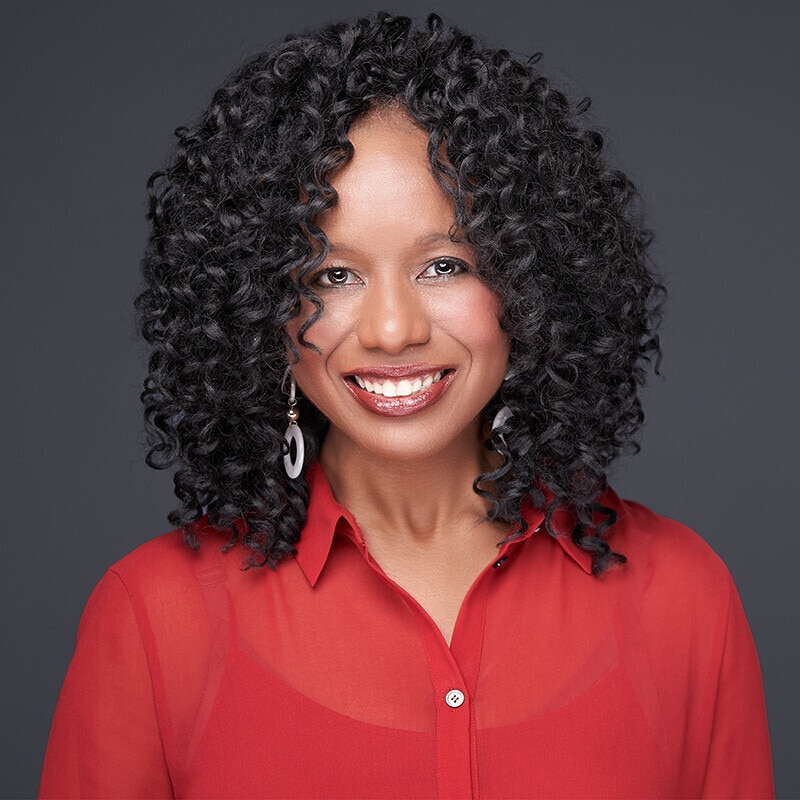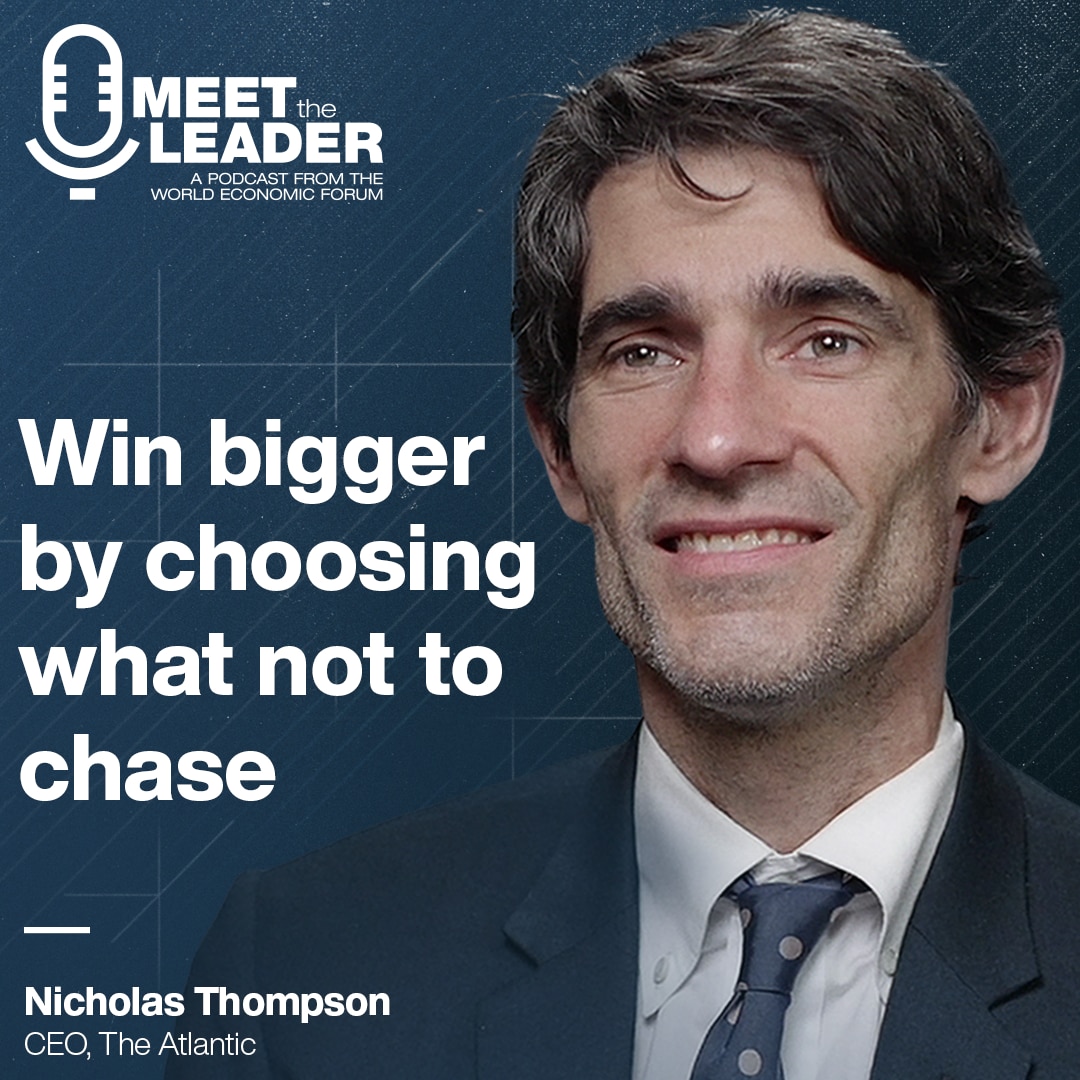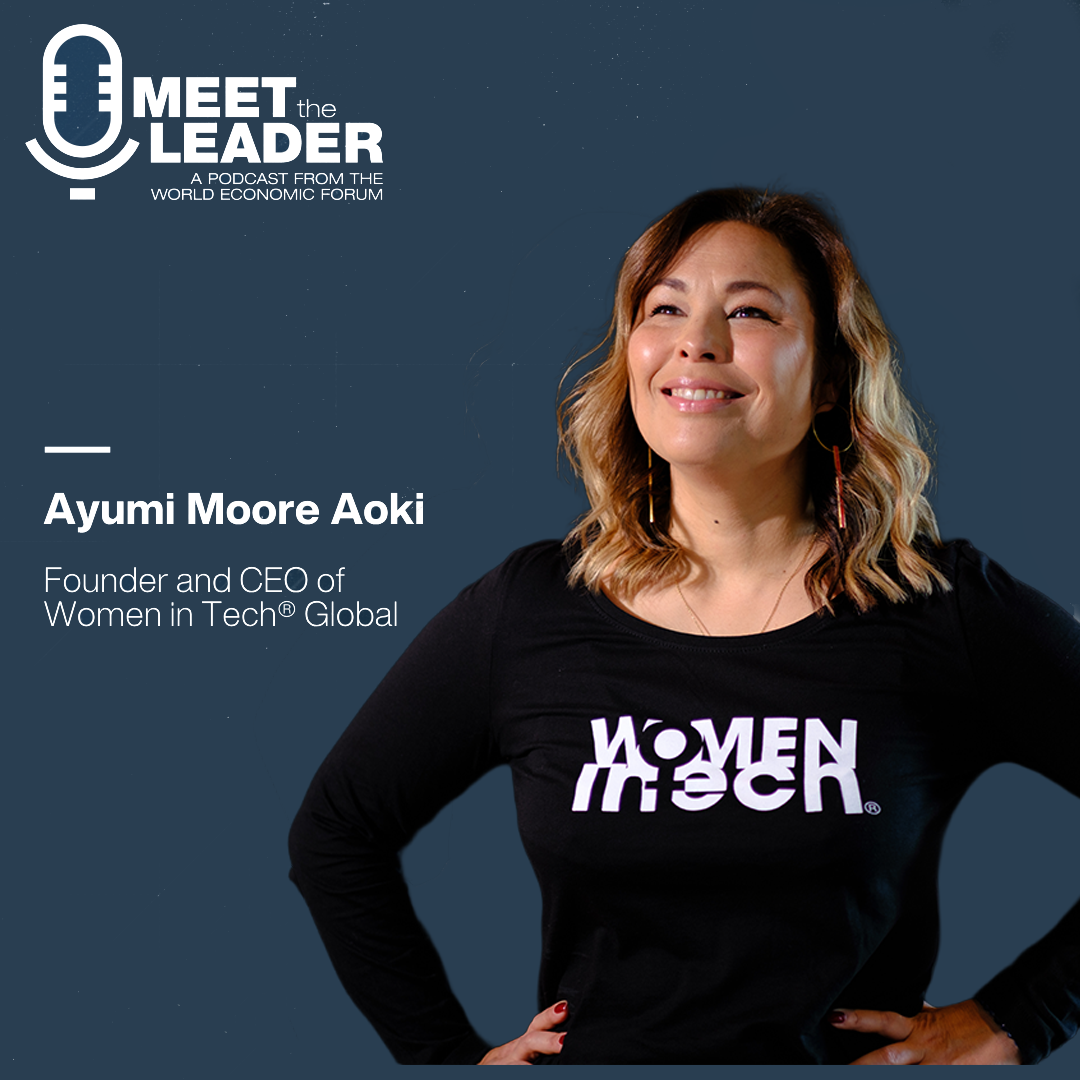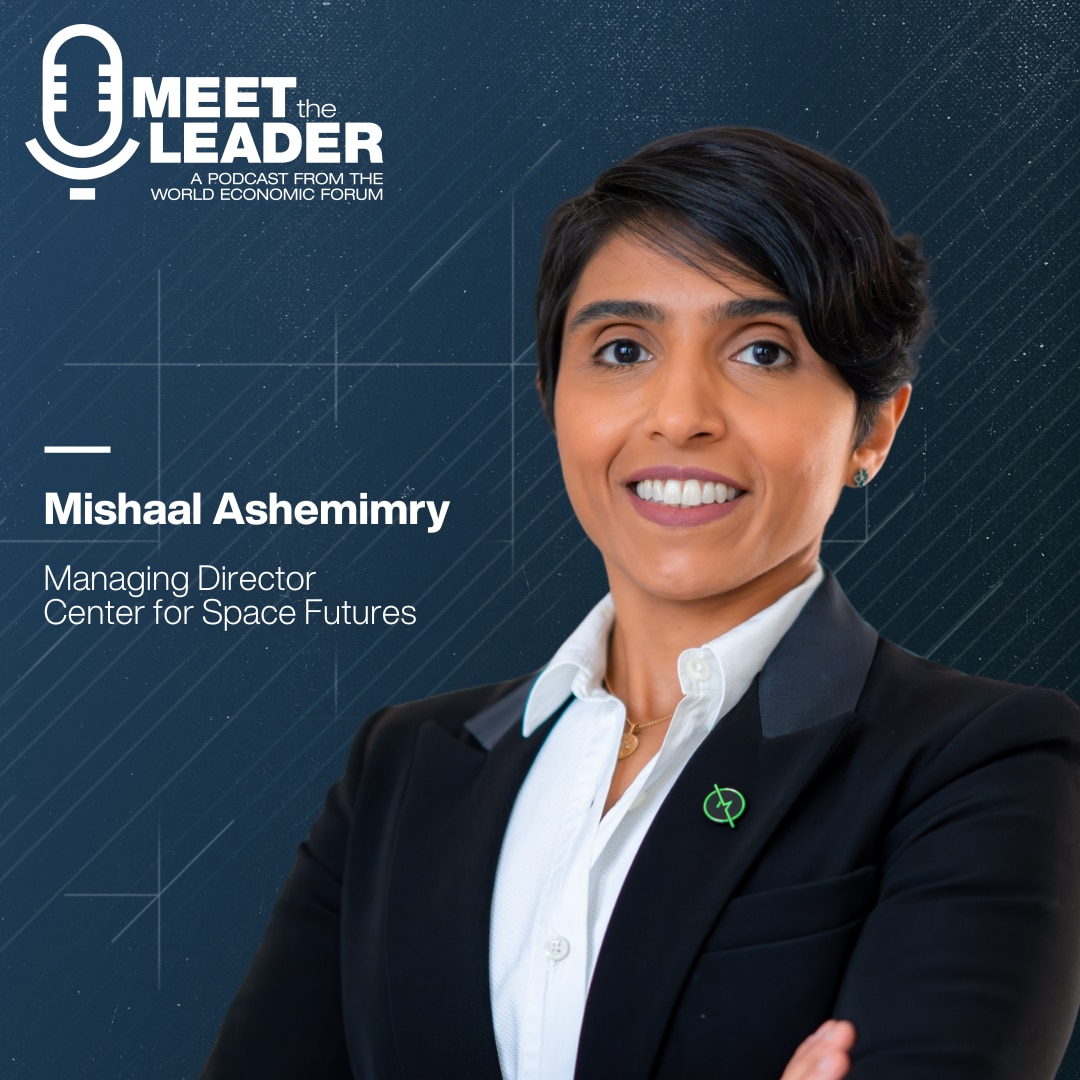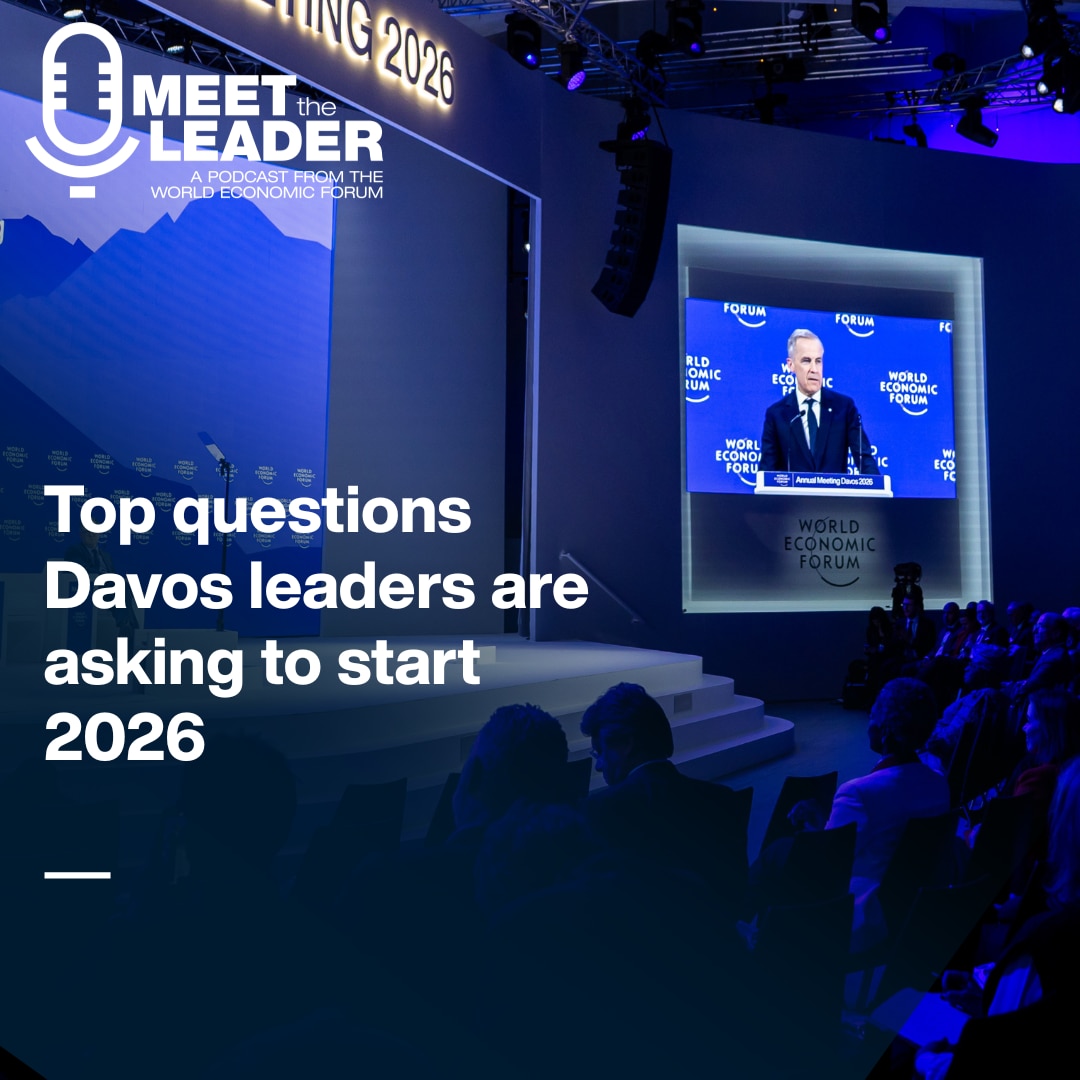How leaders can prepare teams for the future of work: ADP’s Chief Economist
Podcast transcript
Nela Richardson, ADP: The new way of thinking is not about jobs; it's about tasks. It's about skills and how this skillset could be related to another skillset that could be in a totally different job. That's how you help workers transition.
I think, in the next 10 years, instead of talking about which jobs got created in the economy; we're going to be talking about what tasks got created in that economy, what skills were developed in that economy. It won't be so much about jobs or distinct classifications; it'll be about tasks, skills and productive output.
Linda Lacina, Meet the Leader: Welcome to Meet the Leader, I'm Linda Lacina and I'm very proud to welcome you into our New York studios once again at the World Economic Forum for a very special conversation, this time, on the future of jobs. We have with us here today Nela Richardson. Hi, Nela.
Nela is the chief economist at ADP and that is one of the biggest providers of corporate payroll services in the world. She's also the head of the ADP Research Institute. Now, Nela is not here, as economists typically are in a January, to make a bunch of predictions and forecasts ahead of 2025 – things that we're all going to forget about by March. She is here to talk about something a little bit more tangible and a little bit more useful: our jobs.
Have you read?
Our new Future of Jobs report, just released, finds that there's going to be big shifts in everything from tech to demographics to geopolitics. And that is going to create a net 78 million new jobs by 2030.
But there's a hiccup: the workforce doesn't yet have the skills in place for these jobs and nearly 40% of the skills that will be required on the job are set to change. Employers are rightfully worried about this and our survey finds that two-thirds of employers feel that the skills gap is going to be the biggest barrier to future-proofing business.
ADP contributed research to our Future of Jobs report and Nela is going to talk a little bit about the report and also some good news, like the dramatic change that upskilling could bring to wages for workers getting reskilled. She'll also explain why 2025 is going to be a pivotal year and help set the stage for the workforces that we will need for the future.
Welcome back, Nela. It is your second time. You are a repeater here on Meet the Leader. Thank you again.
Nela Richardson, ADP: Do I get a jacket if I do it five times?
Linda Lacina, Meet the Leader: You absolutely do. I wish we could give you a jacket just for coming twice. Why don't we get started with sort of a top level – can you get people schooled up on the future of jobs report? What is it and why is it so important?
Nela Richardson, ADP: Well, it's important because the labour market and employment touch every single facet of the global economy. And what we're seeing now are two things that are going to be historic and I really view 2025 as a pivotal year. What you're seeing is the merger of demographics, which are destiny and many economists think that, and this new generative AI technology that has the potential to do so much. The conflation of these two things in the workplace means that skills and skills adaption will be so important going into the new year, not just in 2025, but for the next 30 years. Things are changing so fast.
So, enter the Future of Jobs report. Delighted to partner with the World Economic Forum on this really important piece of work, because what it says is: where are our employers in terms of the skills that they need, what they're seeing in the next 10 years and five years even closer in range; and also where workers are at and the merger of workers and employers will provide us with the context to build on for the labour market.
Linda Lacina, Meet the Leader: One of the things that is really key to this is the upskilling piece. Can you give us a sense for the types of skills that we're going to need to shore up that we're going to need to get a little bit better at? What are those?
Nela Richardson, ADP: The first is continuous learning. I know that there's a lot when you think of technology, you think of specific skills like in tech, maybe coding, for example. But in reality, what generative AI and other advanced technologies are doing is sharpening what it means to be human and what humans uniquely bring to work. And what we uniquely bring to work is the ability to have creative solutioning, to collaborate, to adapt and to learn things in real time. And so, if that's what jobs are going to require even more of us, then that's what we have to get really good at, being uniquely human. I know it sounds kind of odd for someone to say, you have to get better at being yourself, but that is actually the advantage and the opportunity.
What generative AI and other advanced technologies are doing is sharpening what it means to be human and what humans uniquely bring to work.
”So what we see is that workers have to learn and employers have to provide that platform for learning. And there's huge opportunity and advantages for doing that. You know, there's only one way a company grows or an economy grows, it's when there's more workers and those workers become more productive. And the promise of generative AI and other advanced technologies is to make the workforce more productive, which raises the standard of living. So enter into our research, what we find is that if a person is upskilled from one onet, which is a standard way of classifying job preparation, so from one level of job preparation to another, they can expect to see an increase of about 37% in wages. So there's real dollars to be earned just by committing to upskilling.
Linda Lacina, Meet the Leader: And you mentioned that 2025 in particular will be pivotal to sort of get started on some of this. Why is that? Why this year?
Nela Richardson, ADP: Well, first of all, we've come a long way, right? The global economy has seen something that has never been seen before on the scale, which is a pandemic reorienting work and it's changing work in profound ways. Work is becoming more and more borderless. The technologies that were needed to get the global labour market through the pandemic have now been cemented in the workforce. The ability to collaborate and work anywhere at any time has never been more prevalent.
At the same time, we're seeing advanced technology take root in business and it's going to be formative in the way we work in the future, especially for entry-level positions where Gen Z has the most promise. So when you add up the context of where we've been and where we going, what you see is 2025 stands at that turning point, that pivotal moment between past advances, many of them spurred by the pandemic, and reaching to the future and digital work and demographics, where you're going to see a more global, talented workforce come into form for companies.
Linda Lacina, Meet the Leader: The report talks a little bit about some of these skills, say continuous learning, and some of the things that we'll need to shore up are things like being more analytical, sort of being a more creative thinker. Leaders are going to need to lean on influence, but also leadership throughout an organization, right? Not just this top-down sort of thing up. So if we look at what people can do right now, what is that? If I'm a leader listening to this, what can I do to sort of make sure that we have a practical thing in place to to shore this up?
Nela Richardson, ADP: If you're entering into a world and I think most leaders are on the same page with this, where you're going to see rapid change, the best thing you can do right now is to establish trust with your teams. Because change is hard and change is not something that the workers are going to just know how to take on by themselves. In fact, we have research at ADP that shows that most workers think that AI and these new technologies will change their jobs, they're just unsure how. And so here is a place of leadership. I think when you are looking at uncertainty, the antidote to uncertainty is clarity. We don't know all of the impacts that AI will make on work, but if a leader can build trust, they can provide those clear steps to change together in the workforce and I think that's going to be what's required.
I think also there's going to be a need to look for opportunity because change is not going to be felt equally among everybody and we see that in the the work that we shared with the forum in the Future of jobs report. Yes, a typical worker will see a 37% increase if they are skilled from one job zone to another, one level of preparation to another, but there is a big difference by gender. At the the highest level of preparation, those jobs that required the most skills, men see a 44% increase in going from one level of skill to another. Women – Linda, are you ready? – 15%. That disparity means that there is ample opportunity to not only close the skills scrap for workers, but also close the gap in the return of skills to workers. And why do companies want to do that? Because everybody wins when there are more workers included in the workforce. Those workers are paid their worth and they're more productive. And so it circles back to the company's bottom line of more workers and making those workers more productive.
Linda Lacina, Meet the Leader: When you talk about building that clarity to get to trust, what should they be thinking about or saying to help kind of lead people through this journey? Because it's going to be a journey. There's going to be changes. It's going to shift. But how can they make sure that people, as they're communicating with their teams, that people feel like they know where they're going at least, they know where this next phase is. How do they build that clarity?
Nela Richardson, ADP: Well, first, it's right to build clarity. It's harder to trust things that you don't understand and so communication is going to be vital for the leaders of the future. We've all grown up in different types of working environments and some mandates come from on high and you just kind of do them because you work for an employer and you're told to do them. That is one approach. But when you are in a period of rapid change that requires a productive and engaged workforce, if you want your workforce to be loyal to you, retain your best talent, then in communicating, the 'why' is going to be as important as communicating the 'what'. Then the next level of that is communicating the 'how', this is the expectation. How are we as a global team, as a workforce team, going to engage and making ourselves the most productive possible? So that's the challenge of leadership, to communicate the what, why and how to the workforce.
Linda Lacina, Meet the Leader: If this doesn't happen for any reason, it's overlooked, people don't have the time for it or they don't see the purpose in it, what happens? What do we lose if people don't build this trust and that clarity?
Nela Richardson, ADP: At ADP, at the ADP Research Institute, we are always surveying workers. We survey them globally in our People at Work survey. We survey them in the US once a month. What we found is, if you can embed trust, trust in your team so your team members feel like you have their back, trust in your leadership and not just trust that the leadership is making the right decisions, but there's no boundaries for your progression in terms of becoming part of that leadership. If you can build a holistic sense of trust, end-to-end, from company-to-company, you get a workforce that's willing to do a lot for you, more productive.
And I think that's the first place that companies should look at their own workers. Start measuring their sentiment. Start understanding what really leads them to trust you and your leadership. Understand and listen to the values that your workforce is telling you that they hold dear. When we look at the contributions that we made to the future of work study, workers really want to see that career development. They really want to see employers support their career journey. And yet when we look at our own data at ADP, when we look at the number of workers who are actually upskilled in the first two years of employment, it's very, very low. Only 4% of 50 million workers that we studied over a five year period were upskilled in that two-year period. So that's a big opportunity for employers to build that trust by providing workers with what they want, which is that skill development and career progression.
Linda Lacina, Meet the Leader: There's a little bit of a disconnect between maybe employers looking for people's looking after people's well-being, but also employees sort of saying, okay, I just really need something to kind of take an eye on my stress reduction. Tell me a little bit about that and that gap.
Nela Richardson, ADP: Understanding the gap is the first thing, but there's places of alignment and places of disconnect and we've seen that in the study. It was great to to merge the World Economic Forum's corporate data with ADP's research on the employee to really see where these gaps were, which is what we did in that report. But I think there I would like to start with the commonalities. There is in both camps a real need for career advancement and understanding that talent journey. Both the employer and the worker want to support higher wages. Now for workers, it's probably pretty evident why higher wages are their top priority. But again, for companies, higher wages actually reflect higher productivity. If they're paying higher wages, it's because they are seeing that workers are producing more for a lower cost and that is directly feeding into the bottom line.
Where workers are and companies are more disjointed – and maybe it's well-intentioned by employers – this whole being, whole care of the person, it's been a big priority for employers especially coming out of the pandemic. But on the other side of the pandemic, what workers really evaluate is their time, their autonomy. That's something that we all got a taste of, in a very profound way, during the pandemic. Workers are saying, I still want that, and it doesn't necessarily mean I want to work from home, for some workers, it does – it's more flexibility around time.
I think they're both important: well being is important, especially when it comes to work stress and we have surveys that support that conclusion; but also, how do you increase that autonomy that workers value, that flexibility even if you have to be on site to do your job? There's ways that employers can show up for their workforce, in new [ways] than what we experienced before the pandemic, to give them that flexibility.
Linda Lacina, Meet the Leader: If workplaces are doubling down on things that workers may not have as their top priority, what kind of tensions can kind of come from that? How can that sort of manifest itself?
Nela Richardson, ADP: So we're talking about change and change is a team sport. You can't just have a coach to win the game, right? You have to have players on the field and everybody has to know their role and their expectation. If there's any misalignment in that organization, you're not going to win.
I think that the stakes are pretty high now, they're pretty profound, not because work is structurally different – I mean, many of us are doing pretty much the same job that we did five years ago – but the change is going to just pick up in pace. Our work is becoming more global, it's becoming more complicated, it's becoming more precise and specific. In many occupations, you're going deep instead of broad. And because of all of that, setting expectations, everyone knowing their role, everyone understanding the end result is vital to competition, to compete in the world.
Linda Lacina, Meet the Leader: You talked about the skills piece and I thought it was really interesting that employers are prioritizing this – the surveys on our side sort of found this – but the ADP research also found that workers, while they thought skilling was important, it was ranked maybe 7 or 8 on the list. Can you talk a little bit about that?
Nela Richardson, ADP: I think that it depends on the time period, because what we hear, when we surveyed workers at the beginning of the pandemic, it was about flexibility. But as we have increased our surveys throughout the last five years, it's not necessarily flexibility in time that's really reigning supreme, it's that sense of autonomy. More and more, especially in regions of the world like Latin America, Middle East and Africa, we're seeing the desire for skills and upskilling become more important.
That's not surprising to us because if you look at where the prime age worker is moving to over the next 30 years, it's moving to exactly those regions. You're seeing a younger workforce take root, a workforce that will in the future, have never seen work without generative AI being part of that work, the digitization of a lot of occupations and the need and desire to make changes in order to compete globally. Those workers want to see skills. In older countries like the US, Europe and China, they're still trying to understand their footing as the prime age worker is becoming more seasoned.
I think it depends on where your career journey is and that's where we see a bit of a disconnect. This is the first time in human history where there's been five generations under one roof in the workforce and there's a lot we can learn together. But when it comes to skills, I really think it's important that employers leave no worker behind. It's not just about upskilling Gen Z, it's upskilling your more tenured workers as well and learning from all of the workers in that process.
Linda Lacina, Meet the Leader: The Future of Jobs report finds that upskilling is going to miss some people and I'm going to read from this. It says: if the global workforce were represented by a group of 100 people, 59 are projected to require reskilling or upskilling by 2030; 11 of whom are unlikely to receive it, translating to 120 million workers who are at medium-term risk of redundancy. Long and short of it being that there's going to be a gap of folks that maybe won't benefit from this upskilling. How should leaders be thinking about this fact?
Nela Richardson, ADP: They should be thinking about transitions. Transitions are often disruptive, but if you think in the form of transitions, you can help your workforce. The skilled talent that you have and the skills that you would like to build in your talent, you can transition them to another state. We take this very seriously at ADP. In fact, we've partnered at ADP Research with our expert machine learning theorists and statisticians on building a skills ontology to do just that. Look at skills, skills adjacency: skills that might make you a good bookkeeper in some respects could make you a good police detective maybe. So we're looking at these skills adjacencies to help workers with transitions. We know transitions are coming. Transitions are part of a growing economy. It's not new. It's the pace that we're really reflective of in this moment. But if we could figure out what skills are more important to employers, the highest-paying skills, skills that workers may already have and you just need to add another skillset or another language, another coding language, another soft skill in order to move into an entirely different profession, maybe even a more high-paying profession, then we can help workers with transitions.
So as a leader, you are looking at your talent, not just about the job or the occupation. – that's the old way of thinking. The new way of thinking. It's not about jobs. It's about tasks. It's about skills and how this skillset could be related to another skillset that could be in a totally different job. That's how you help workers transition. At ADP, we're known for the National Employment Report, where we actually provide an estimate of jobs for the month. I think in the next 10 years and said talking about which jobs got created in the economy, we're going to be talking about what tasks got created in that economy, what skills were developed in that economy. It won't be so much about jobs or distinct classifications. It will be more amorphous than that. It'll be about tasks, skills and productive output, so the sooner leaders get their minds around these transitional periods in talent and then skills, the better they will be adapted to the future.
Linda Lacina, Meet the Leader: You talked a little bit about the the ADP, the skills ontology. Tell us a little bit more about that. What is that for people who aren't familiar?
Nela Richardson, ADP: So there's been numerous efforts by companies, by governments, to try to quantify and assess skills. One of the popular ways of doing that is through own it. It really counts the different kinds of skills that are related to certain occupations. An ontology is basically just a way to classify different skills and talents.
But what's unique again about this moment that we're entering into is that skills and tasks are going to be changing very, very quickly. And so how do you provide an ontology that's real time, that reaches to new jobs that are being created, new skills or skillsets that are being developed? That was the task that our team tried to solve for and it continues to work on, which is building a skills ontology that takes into account these real-time changes in what workers want and what employers demand.
In doing that, what you're going to be able to do is look at the skills from a transition standpoint. Now, the unique thing about ADP is that our skills ontology fits nicely within our own platform, so not only can we tell you about skills and how skills are evolving, but how much you get paid for certain skills because we have this great wage data. We can tell you about promotion in these skills because we have an HR backbone to our data. So we can not only give you that skills ontology, we can contextualize that ontology and show which skills can take you to the transitional place that you need to be.
Linda Lacina, Meet the Leader: Correct me if I'm wrong, this tool also sort of helped employers understand where the demand was, where workers were maybe interested in certain titles or certain types of roles. Why is that so important for for employers who want to make sure that they're competitive?
Nela Richardson, ADP: As you are thinking about jobs, you're trying to create the best talent. Having a real sense of what's out there is really, really important, because your talent may be evolving in a different way than your workforce, your talent pool.
Let's take a step back on that point a little bit. We're rapidly, if we're not already there, we're soon there, [at a point] where talent outreach has gone global. At ADP, we're seeing even small and medium-sized firms reach across borders to find the best talent.
It used to be you wanted to find the cheapest talent; in today's world, you want to find the best talent wherever it is – and digital work enables that. So, when you're looking at the workforce, your talent and how it's developing in Singapore might be very different than how it's developing in the Netherlands or in Brazil. But what's great about it is, we have this unique way of posting jobs, posting resumes. There's all kinds of social networks that allows for us to see talent in different pockets of the world and use generative AI tools to collect all of that talent and form it into a skills ontology. So you're not hamstrung by where you are. You're not hamstrung by your local employer base. You are opening up as an employer to the world and all the skills and talent that the world offers. I think it's just such a unique opportunity to have a handle on talent like never before.
Linda Lacina, Meet the Leader: How is this helpful for them to sort of understand the range and the ability of skills that they can tap into? What gap does that help bridge for employers who are hiring?
Nela Richardson, ADP: First of all, it helps bridge an age gap depending where you are in the world. Maybe you're looking for more senior talent, can't find that; or more entry level jobs, can't find that. Maybe you're a manufacturer, you're looking for more vocational talent [and] may not be able to find that. So it helps you find the talent where it exists for the jobs that you have now.
But I think the most important advantage that employers need is where the talent will evolve. Again, the underpinning here is change and it's going to be fast. Business models are changing. Operations are changing. Digital work and generative AI it's a platform that allows for work to be funnelled in different ways. I think of this as the new globalization. As economists, we think about globalization in terms of the trade in goods, maybe the trade in services, trade in financial capital. I think the new globalization is people and how we can connect global talent anywhere. That's the advantage and that's the network that will push the global economy in a different direction. If companies want to keep pace with that change, they have to adapt to a more global-resourced talent pool. Skills help with that.
Linda Lacina, Meet the Leader: Does this help drive home for people the importance of skills that, honestly, probably have been maybe dismissed? We all just assume: yes, of course you need to be creative, analytical, you need to be a team player, you need all these things. But we just assume people have it. We don't really think that we need to be prioritizing this in our teams and we need to make sure that people have these things. Does this sort of help leaders to say, we really need to prioritize these particular things?
Nela Richardson, ADP: Soft skills never go out of style and I think that's why we dismiss them, because they're just part of work. But skills are becoming more specialized. So if you think about the capacity of generative AI – let's go back to that – it really is in that entry-level position. It might do the things that a paralegal might have done otherwise. It might do certain things that a bookkeeper or an accountant might have done. The conversation is not about doing basics, not that these are basic tasks, but doing tasks that a computer can readily adopt. It's about finding those aspects of the job that a computer can't do. For an accountant, it's, you know, building that trust with a client to solve a particularly thorny situation where there's many avenues. That decision-making option is going to be really important for people faced with a lot of information and a lot of opportunities, which one fits your personal perspective and situation? That's going to be the task of people. So decision-making, personalization, good judgement, the ability to collaborate.
We say a lot about Gen AI, but we don't really talk about how this AI is collaborating with that AI and the strengths of this. I mean, it's still very much of a competitive pace. But with people, we talk about networks, we talk about collaboration all the time. That is the case that a lot of companies have made for getting people back into the office. They have more of that collaboration. That's why we have these tools that enable fac- to-face or, at least, remote conversation, that's why we're having this conversation is in the face of collaboration. I do not foresee in all of my future-gazing two AI chat bots having a podcast and endearing themselves in the same way that humans are. I know that AI is having conversations with AI on podcasts. We can all look them up right now. But Linda, you and I are doing something special. It's human-to-human connection and I think that's going to be the thing that really advances society in a whole lot of different ways, including health, the economy, you name it. It's really about creativity, real-time thinking and the ability to take your idea and my idea and create something new.
Linda Lacina, Meet the Leader: With this skills ontology, how has ADP already been putting this into place?
Nela Richardson, ADP: With some clients, it's been really helpful in finding out what talent is out there and what skills. It's almost like a dictionary of skills that they can actually apply. It's helping them resource and fill positions, which is really, really important.
In the future, I think it's going to be critical for transitioning through jobs, finding the most lucrative jobs for workers. So I think it's like a double-edged sword in the sense that it cuts both ways, both for employers and for workers. For employers, it helps them find and retain talent; for workers, it helps them prepare for the new jobs that are coming. So I think it is the bridge to the new economy, this ability to really categorize skills and be able to quantify how those skills are related to higher levels of compensation and higher levels of productivity.
Linda Lacina, Meet the Leader: I want to talk a little bit about your background, Nela. In high school, you were on the debate team, and as a young nerd, I was also on a competitive speech team – the forensics team not as cool as the debate team – but you competed in impromptu speaking competitions. And I want to talk about this because I think it's very useful for leaders to sort of understand some of the skills that you kind of built as a high-schooler. Can you tell us what that is? What is impromptu speaking?
Nela Richardson, ADP: Well, you're given a topic and maybe three minutes and then you have to form a speech in which you're judged on the topic that you were given. I did a lot of debating – you're looking at the Indiana State championship my junior year, so there you go. But I think both of those things, you're responding to real-time perspective and you have to do so in a way that's persuasive. When I remember growing up, I used to get on the bus, 4 a.m. in the morning ,and drive all over Indiana to – and this might ring some bells – speech and debate competitions. And you call it nerdy. Some would call it a little nerdy, but for us, it was like exciting. It was exciting to be in this moment. And you would think that the topics would lend themselves to a very sophisticated audience. I did Lincoln-Douglas debate, which is based in philosophy. So you are talking about John Rawls and all these great philosophers and asking really important, deep social questions as a 15 year old and having all the answers. But most of the time I was debating not in front of professors or business leaders. I was debating on whoever they could get at six in the morning to judge a debate competition, which is often your bus drivers because they were there. It was whoever was running the cafeteria. It was the teachers that were on staff. It was, you know, whoever they could bring in. The parent who had nothing else to do on a Saturday morning but to listen to a bunch of 15 year olds talk about John Rawls, that's the person who is your in your audience. So I think making things relatable, letting people feel something for the conversation. I think it's really important when we think about something like generative AI, for example, it feels so detached from our actual experience. We know it's out there, but we don't know what it means for me. What does it mean for my job, my retirement, my kids, my ability to pay for college tuition? And I think debating in Indiana gave me that sense of here's what it means for you and why you should be paying attention. When you get people to pay attention because you've said something personal, that means that they are more willing to be open to change.
Linda Lacina, Meet the Leader: And how is that helped you in your work as a grown-up economist?
Nela Richardson, ADP: I use it every day. Honestly, I use the ability to adjust quickly. What I love about speech and debate is you don't get a lot of time to overthink and for all of us over-thinkers in the world, limiting the amount of overthinking and just giving a response is really helpful. But I think there is a sense of like organizing your thoughts, communicating clearly, trying to figure out what's important, how to invest the person in the conversation in order to get the result that you're after, I think that's really important.
Linda Lacina, Meet the Leader: And again, I think it comes down to maybe people dismissing soft skills, the communication that people have between each other that has real power. If you can get someone to connect and get them on your side, then you've got maybe lightning in a bottle there. How does that help, especially with something complicated like economic trends and data?
Nela Richardson, ADP: It's about getting someone on your side. That's sometimes pivotal. When I was at my best as a debater is when I listened very carefully to the other side. We think about communication skills as in one direction – you're communicating something to someone else. It's actually both directions. To be an effective communicator, you have to be an amazing listener. You have to be a better listener than you are a speaker. I think that's where people go astray. They're really good at putting words together. They sound very persuasive, but they might miss the mark of where the audiences.
Linda Lacina, Meet the Leader: And there's also a preparation element that's very helpful with impromptu [speaking]. Where you sort of have maybe a couple of things that you can always draw on and then you would deploy them when needed. Can you talk a little bit about that and how that could kind of help any leader who's trying to make sure that they're reinforcing important messages?
Nela Richardson, ADP: Humour. I once read and actually it's it's funny that I did so much speech and debate, I should take a step backwards, I was a very shy kid. And when you grow up in Indiana and you're and you have a shyness, what your mom does is they put you in theatre. They do something that's very counter to your natural inclination. So being in theatre, doing impromptu theatre sketches was something I grew up doing as a kid in community theatre. If you were to relate that to being a leader, one thing I learned is that humour spells confidence. Often if you can just make a joke, usually self-deprecating, release the tension of the situation, especially one that is centred around change, disruption, upheaval, not take yourself so seriously as a leader. I mean, one of the things that unites us all is humour. I love when I'm speaking in front of a group and I make that group laugh, it's a shared experience – even if they're laughing at me, which I'm going to suspect sometimes they are. That shared communal experience of laughter reminds us that we're all humans together. And so, maybe one of the things I learned from impromptu speaking is that humour goes a long way.
Linda Lacina, Meet the Leader: In college, you were a triple major, and I think people could guess in economics and maybe even the math bit, but in philosophy. Tell me how that worked. What drew you to it and also how do you use it today?
Nela Richardson, ADP: When I was younger, I was fascinated by information and the philosophy of information and the theory of knowledge: what we could trust, what we could not; how people learn; how language affected our thought processes; did you have to have a big vocabulary to have a big understanding of the world? Could you have a very, very limited, almost primitive vocabulary, maybe like back in the Stone Ages, and still have grand thoughts on physics?
I was really attracted to the questions of how people think, how people learn and what role language had in enabling that. I struggled more with ethics and morality. I'm going to say, when people find out I was a philosophy major usually they asked me about like political philosophy or moral philosophy or ethics. These social kinds of philosophies about how people relate to each other in bureaucracies or in democracies or all kinds of government structures – that wasn't what I was interested in. I was interested in how an individual thinks about the world and so that's why I double down. And it's funny because I use philosophy quite a bit. I did a lot of math in undergrad and graduate school, in my Ph.D. training, I'm going to say that I use philosophy a lot more than I do math right now.
Linda Lacina, Meet the Leader: How so?
Nela Richardson, ADP: Because when you're looking at change, it helps to step back and think about the grand scheme, the context, how people learn, how people interact, what the result is. The pandemic was a huge opportunity to think about what it meant in terms of where the world was going and evolving. When I saw so many jobs lost in the United States during the pandemic, I thought to myself, wow, that's a lot of jobs, that's 20 million jobs lost in a period of a few weeks. And as much as we're going to talk about the next three or four years about those lost jobs, it's going to get interesting when change becomes a choice, because then we're not all mandated. Then we can make different decisions. Those decisions are going to be unique to the people making them and that's when things are getting interesting. And Linda, I tell you, I think we're there now.
We have access as the global workforce, as corporate society to so much information, so much data, so much technology. Each business is going to make a slightly different choice and collectively those choices are going to form the future path of the economy and the future path of the human experience. I think it takes a philosopher to really understand how profound the moment we are in right now is.
Linda Lacina, Meet the Leader: How would your work be different if you'd never studied philosophy?
Nela Richardson, ADP: I'd be giving you predictions on inflation and the labour market right now. I mean, I think it changes the questions you ask. It changes the value of the work. It's funny because labour in grad school, in economics, and labour in the real world is very, very different in the real world. When people talk about the labour market, they talk about the jobs report, how many jobs were created, what wages were like, what that means for a central bank. In graduate school, when you talk about a labour market, when you talk about labour economics, you're focused most times on the individual and how the individual is responding to a lot of different incentives. A labour economist, an academic one, is focused on the well-being of the individual. So instead of the macroeconomy and the facts and the stats around the labour market, you're focused on how to help people attain their best state of well-being. I think that's a philosophical – I mean, economics is a philosophical degree so in some sense I'm practising philosophy all the time – but that sense of how to move people to the best state of their well-being, I think is embedded in economics, is embedded in philosophy.
Linda Lacina, Meet the Leader: Is there a philosophy that was shaping to you?
Nela Richardson, ADP: I really liked John Rawls. I've mentioned him a couple times. The idea of distributive justice. I won't go too deep into that, but I think again, when I think about my worldview, it's always been about how to help the individual be more productive. Whether it's by moving capital to places of opportunity like financial capital or skills, making skills more accessible, I think it starts with the power of one to improve their lives. And if you can create the conditions in which more and more people can access things that generally you couldn't access because of where you lived or who you were. I think that is something that I would hang my hat on as an economist, like bringing the ability to improve your lot in life to individuals wherever they are, I think is so super important. And the world is like – we've never had more resources and the ability to do that than we do now.
Linda Lacina, Meet the Leader: Once you got your Ph.D., you finished your dissertation and you had a two-month-old baby on your hip, where a lot of people who are in that same position don't face that. A lot of. There aren't a lot of women economists. Can you talk a little bit about that timing at that moment? Because there's a really interesting decision that you made about the employer that you chose. And I think it's a really helpful lesson for leaders and for people who are also evaluating opportunity. Can you talk about that moment, that pivotal moment?
Nela Richardson, ADP: I've written about this actually. It's funny because I was very well prepped by my advisors to go out on the jobs market. I could talk about my dissertation backwards and forwards and all the way around. What I was ill-equipped to do was talk about this amazing, life-changing thing that just happened to me. So I went into every interview prepared to work.
I remember once I went to a government agency, I won't say which one. I did the thing that I had been trained to do, which is talk about my dissertation, you know, all the techniques and methodologies that went into it. All the hours, two years writing something like this. I remember the interviewer saying, you know, you work with a lot of different people in this role, some are technical, some are not, and we just want to know who you are as a person. Could you tell us a little bit about that? I had just had a baby and I was afraid to say that I was a new mother on this interview because I didn't have the talking points to talk about this change in my life. So I said, well, for fun, I like to eat and watch TV because that was the only thing that I really wanted to do as a new mother who was out on the jobs market.
I think the interviewer just looked at me and was like, this person has no personality. I tried to clean it up. I said, I like to watch cooking shows. That didn't help. I couldn't communicate. I didn't have the words to communicate every part of me.
So fast forward, I interviewed with a company and the first thing they asked me about was my family and I said that I was a new mother and that wasn't a ding, that was actually a place of connection. Then they talked about their families and then eventually we got around to my dissertation. I ended up joining that employer because they made me feel like a whole person.
Linda Lacina, Meet the Leader: What can people take from this? Let's just say, the person who is job hunting: what should they not be so worried about and what should they be seeking out if they can?
Nela Richardson, ADP: We find that workers do better when they are engaged with their employer. They have more loyalty and they have more productivity. What does do better mean? It means that you trust. You trust that you are joining a team that has your back, that they have shared values, that you believe in the company's direction.
The first thing I would say to anyone – and I talk to a lot of young people who are trying to make their first moves into the labour market – is know the company that you want to join. I know there's a tendency to just send mass resumes out and have a very clear-cut view of how you want to represent yourself. Take a moment to look at that company's website, understand what their goals and missions are. Does it fit with you? That's going to be really important to your future happiness. You want to make sure. It's like going into any long-term relationship: you want to know what the company on the other side stands for.
I think the second thing you want to know is, will that company tolerate you? We tend to hide ourselves in entities. That's perfectly acceptable. That's perfectly fine. But the things that you're super passionate about, things that are super important to you, you have to understand whether or not that company culture is going to embrace that and allow you to be that. Now, I don't think you should share everything about yourself, especially not on an interview, but you need to kind of feel the waters in terms of how you can act if if the skills of the future are the soft ones. Is this a place where you can grow those soft skills? Are there's opportunities to collaborate? Are there opportunities to think creatively? Are there opportunities to learn? You want to really know that before you commit.
Linda Lacina, Meet the Leader: There's also this element of just knowing yourself, you know, here's what I prioritize and here's what really I need to shine. And will I be able to do that here? Is that a question people don't ask themselves enough? People need to pay the bills, they see an opportunity and maybe they think, gosh, I'll look past this red flag I see, because it's a great title or it's a great a name, a great brand. But how important is it then for them to kind of review that little list they have of the two things that are the things that make me shine, whether that's my home life or my own talents. How important is that for them to just review that and go forward?
Nela Richardson, ADP: I think it's great to have an understanding of what work environments that you thrive in. In fact, that's one of my standard interview questions. How do you thrive? Do you like a little more stress? Do you like to collaborate? Do you like time alone? Having that sense of self is really important. But I also think it's important to know that that might change through your career, through your job, through your team. So self-awareness is always critical, but knowing yourself and allowing yourself to change through time is really important as well. For employers, it's about creating those spaces for workers and, you know, every person on your team might be a little different. So being flexible on how people thrive, making that unique and personal – it's a challenge to do that, but I think it's super rewarding as well.
Linda Lacina, Meet the Leader: One of the roles that you've held in your career, you worked for Freddie Mac and you worked during the really interesting time, which is during the housing crisis. You know, how did that shape you? Tell me a little bit about that time and how it informed how you look at data and trends.
Nela Richardson, ADP: I've been thinking about how that experience shaped me because it really was profound. It was three years of enormous change in the US mortgage market. It led to the financial crisis which led to a global recession. So those three years were, as you mentioned, formative to me.
But when I think about it as career development, what was interesting about that time is I was allowed to be a fly on the wall. My bosses took me to conversations with regulators. I was taken to investor calls. I remember one boss brought me to a press conference. It was my first press conference and he said, how would you like to join me? I was, like wait, what? I was given all these different experiences and it helped me a lot. And I think if I had one concern about younger workers is they're not allowed or given that time because of certain different – I think hybrid work is great, it doesn't fit every business and most jobs you can't do remote, but having some time in office allows you to be a fly on the wall and see how other people are working and connecting. See different parts of the business that you may never have experienced if you were working remotely. In our fast pace, do bosses still bring their younger talent with them into important meetings for no other purpose than to sit and observe? That is so critical to future development. So I try to embed that in my own team, that ability just to show up and be there and learn.
Linda Lacina, Meet the Leader: I think it's gotten even more challenging for employers and for bosses because with the hybrid work environment, maybe there's fewer opportunities or maybe you don't know how you can kind of plug people in. But if we were going to tell people like, hey, look for these opportunities because again, these ladder right up to those soft skills that we were talking about earlier, you know, how are people having influence, how are people thinking creatively? How are they being analytical? So what would your advice be to leaders on why they should find these opportunities even in a world where maybe people are only in the office two days a week? What's your advice for leaders?
Nela Richardson, ADP: Certain parts of our economy have confronted this. If you think about retail, it's gone through an enormous structural change. Now that you can order anything and it be at your door in two days, retailers had to rethink how do you get people into a store. And so what they've done is to solve this question with experience. People go into stores now not necessarily because they need good X, but because they want to experience that environment of shopping. There's something special about going into a certain store, whether it is to buy a new phone or to buy a book. There's something that compels you to go. That's what work has to become, especially when the choice is remote or hybrid. What experience are you giving your worker? There are times in my career where I would commute an hour and a half to sit at a cube for nine hours and then commute an hour and a half back. That's not the experience young people are looking for. But if you can give them opportunities to collaborate, to learn new skills, to do something different, I think they will make that trip worth it.
Linda Lacina, Meet the Leader: The workplace, too, is an opportunity for apprenticeship in a lot of cases to sort of, as you're saying, being a fly on the wall to observe people. How are these relationships working, these problems being solved, these decisions being made? Is there also a value in bosses sort of being very deliberate and very obvious and saying, I'm bringing you in to this, I want you to come in because I want you to see how this works. I want you to see how these personalities all mix together. Do they need to be deliberate now when people maybe are less familiar with the apprenticeship model?
Nela Richardson, ADP: First of all, I think bosses being deliberate is always great, setting expectations, providing clarity. But for your young talent, especially young talent that was already upended by the pandemic, they lost a couple of years. I have two teenage sons. They lost a couple of years of interaction in high school. This is the new workforce that you're looking to integrate into your own teams. I think that deliberation is really, really critical.
I think we're at a time where, there's so much around this, individuals are trying to show their self-worth or show what they've done or communicate their lives in certain ways. Rarely are we given the opportunity at work to just come in and observe. And if that's important to talent, which I think it is, to development, providing that clarity is a great thing.
Linda Lacina, Meet the Leader: You have said before that people should think beyond their title. Tell me a little bit about this, because I think it ladders up again to all these things that we've been talking about where people are going to need to be. Everyone will need to be a leader in some sort. Everyone will need to be able to be empowered and think creatively. But what does this mean – think beyond your title?
Nela Richardson, ADP: As I've become a leader, the word that I say most often. I don't know if you want to take a guess, but I say it like a thousand times more than I used to.
Linda Lacina, Meet the Leader: What is it?
Nela Richardson, ADP: Thank you. A job is what you make it. I really believe that. If you think behind your title, you're thinking about how to provide a solution regardless of what your role is. For workers, the thing that I try to hire for that's very hard to capture is curiosity. And so that's the first step in terms of problem solving and opportunity development.
When a team member can just say, okay, maybe this isn't my job, but I see an issue or I see an opportunity or I see a problem that can be solved and I'm going to take steps to help that. It just makes the business better and makes the team better. It makes everybody better. You don't often have to say, well, this is this my job or is this my title? Sometimes it doesn't matter.
We live in a world where knowledge is freer than it's ever been, where people come with all kinds of opportunities and contexts and environments and situations. And I think using all of that to the best benefit of the company is what workers should be thinking about. So, yeah, thinking beyond your title doing so will put you in the position where your boss owes you a big thank you for doing that. Because, you know, bosses can't think of everything. They can assign you the roles that they think of, but they can't assign you everything that you know and can affect. And if you can make your boss's [life] easier by helping them, like seeing you in a different light by, you know, thinking beyond your title, I think it benefits you as well.
Linda Lacina, Meet the Leader: Nela, We are almost our time is almost over, but I have some fun, little quick takes, little rapid response things if you like. Okay, so what I'm going to do is I'm going to start a sentence and then you are going to finish it. All right. Your biggest work pet peeve is?
Nela Richardson, ADP: Inflexibility.
Linda Lacina, Meet the Leader: The first thing that you do when you get up in the morning?
Nela Richardson, ADP: I walk my dog, Lavender.
Linda Lacina, Meet the Leader: The habit that you can't work without is?
Nela Richardson, ADP: I always drink hot tea when I'm writing.
Linda Lacina, Meet the Leader: Good. The biggest mistake that leaders could make in 2025 is?
Nela Richardson, ADP: Not listening to their teams.
Linda Lacina, Meet the Leader: Very good. The thing you'd like to get 5% better at in 2025?
Nela Richardson, ADP: Speaking French.
Linda Lacina, Meet the Leader: The skill that leaders in general should get a little bit better at in 2025?
Nela Richardson, ADP: Communicating change, the reasons and the hows behind it.
Linda Lacina, Meet the Leader: Perfect emails are always?
Nela Richardson, ADP: Concise and clear.
Linda Lacina, Meet the Leader: The best meetings have this in common?
Nela Richardson, ADP: I'm going to maybe change the script than what you usually hear. I love ideas that leave people a little uncomfortable. I love meetings where you're thinking about them and wrestling with something that's creative and challenging that you want to solve together. I love that.
Linda Lacina, Meet the Leader: The biggest challenge that you see for 2025?
Nela Richardson, ADP: Making the pivot. We've come through an enormous amount of change, but change hasn't stopped. We have to look forward to a global future, a digital future, a future that is infused with generative AI. This is the year to make that pivot and it starts with the worker in building trust. If we can get, as leaders, our teammates to trust what we do and trust our intentions and trust the future, then they're going to be more enabled to grow, to upskill and to transition in the directions that the world of work is going.
Linda Lacina, Meet the Leader: I love it. I love it. Who can top that? Nela, thank you so much again for being here for a second time on Meet the Leader. I very much appreciate it.
Nela Richardson, ADP: It's a pleasure, Linda. Thank you.
Linda Lacina, Meet the Leader: It's always a pleasure. And that is all the time that we have for today. Thanks so much to Nela and thanks so much to you, our viewers and our listeners. For more video podcasts, check out the Forum's YouTube channel. And for more Meet the Leader episodes, go to wef.ch/podcasts.
Changes in demographics, technologies and geopolitics will create a net 78 million new jobs by 2030. But current workforces are not yet skilled for these jobs and 40% of the skills needed on the job are set to change. ADP’s Chief Economist Nela Richardson breaks down research from the latest Future of Jobs report and key findings from ADP data - including the dramatic boost to wages upskilling could bring to some workers. She’ll explain why experts might soon be focused on task creation, not job creation, what soft skills will be valued more than ever and how leaders can help prepare their teams for a new future. She’ll also share lessons learned from her own professional journey including how competing on her high school debate team has shaped how she connects with people to this day – and the two words she uses more than any other as a leader.
Topics:
Economic GrowthMore episodes:
Forum Stories newsletter
Bringing you weekly curated insights and analysis on the global issues that matter.
More on Economic GrowthSee all
Sarah Sáenz Hernández
February 24, 2026
